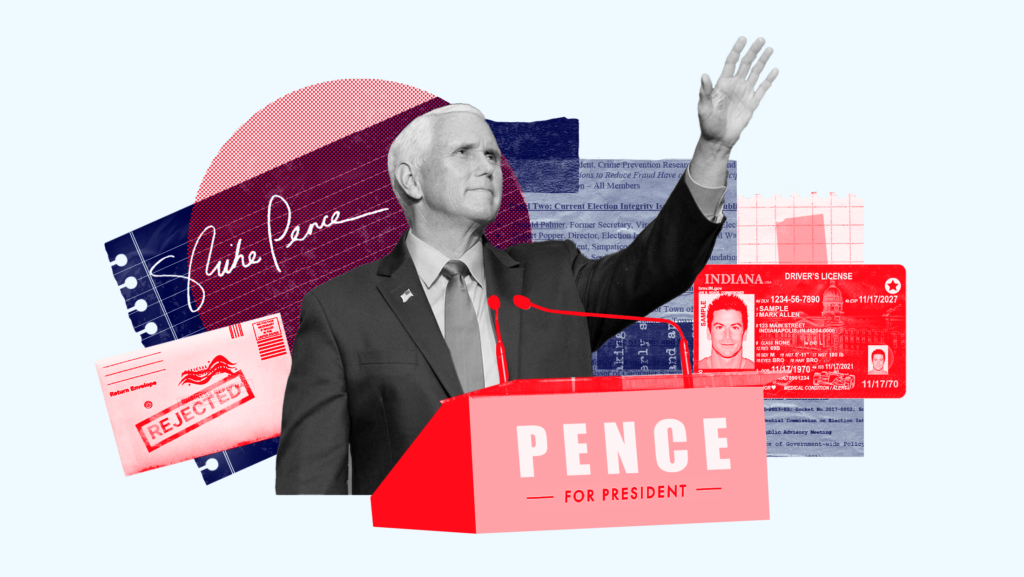Former Vice President Mike Pence’s Record on Voting Rights

On Jan. 6, 2021, a mob egged on by former President Donald Trump’s election lies violently stormed the U.S. Capitol to disrupt the counting of electoral votes. One of the targets of their ire? Trump’s own vice president, Mike Pence (R). In the leadup to the day’s events, Trump repeatedly claimed that Pence had the power to discard the election results during the joint session.
Pence refused, writing a letter stating that he did not have that authority. In response, Trump supporters stormed the Capitol, chanting “Hang Mike Pence” and erecting a makeshift gallows outside the building. In the subsequent days, it became clear that Pence only narrowly escaped the mob.
You might think that a person whose life was endangered by Trump’s false election lies would think twice about continuing to indulge them. But when it comes to Mike Pence, you’d be sorely mistaken. Rather than renounce the conspiratorial thinking and falsehoods that led to Jan. 6, Pence has spent the last two years affirming Republican fears about voter fraud.
Despite being endangered by election conspiracy theories, Pence continues to lend support to them.
In the months and years since Jan. 6, Pence has refused to denounce election denialism; in fact, in his public statements and through his actions, he echoes Republican concerns about elections and spreads falsehoods about voting.
In early 2021, when Democrats introduced the For the People Act, Pence published an op-ed in a right-wing news outlet criticizing the legislation. His critique contained a few outright false statements:
- He claimed that the 2020 election involved “significant irregularities” even though courts dismissed such allegations and former Attorney General Bill Barr (R) said there was no evidence of widespread fraud.
- He suggested that automatic voter registration included in the bill would lead to “millions of illegal immigrants [being] quickly registered to vote.” The For the People act would not have changed the requirement that individuals must be citizens to be registered.
- He suggested that the bill would grant representation to undocumented immigrants, without acknowledging that that’s already the case; during the centennial redistricting process, members of Congress and state legislatures are apportioned based on the whole population, not just the population of citizens.
Throughout the op-ed, Pence also expressed his opposition to several key voting reforms. He argued that universal mail-in voting, early voting, same-day registration and felony voting rights restoration would “exacerbate existing vulnerabilities, and further undermine the American people’s confidence in the principle of ‘one person, one vote.’” He argued that community ballot collection — an important lifeline for elderly voters, voters with disabilities and voters with limited access to transportation — would “expos[e] our most vulnerable voters to coercion.” In doing so, he repeated many of the same unfounded allegations about different voting methods that fueled the Jan. 6. attack.
A year later, as Democrats considered similar voting rights legislation in the Senate around the one-year anniversary of Jan. 6, Pence doubled down on his rhetoric. In a Washington Post op-ed, he compared Democrats’ efforts to change Senate filibuster rules to the insurrection. Yes, he equated using the legislative process in order to protect voting rights with an unprecedented, violent attack on the Capitol. He even dismissed the entire event as “one day in January,” minimizing the significance of Jan. 6 and downplaying concerns over the forces that led to it.
While Pence’s willingness to indulge the same lies that fanned the flames of insurrection may seem baffling, it makes more sense in light of his longstanding commitment to restrictive voting laws and history of doing exactly that.
Pence supported false election claims as a candidate and as a vice president.
Pence’s support for voter suppression laws and beliefs in widespread fraud trace back to his tenure as Trump’s running mate and later as his vice president. At a town hall appearance in New Hampshire in 2016, Pence touted his home state of Indiana’s voter ID law (the first strict photo ID law in the country) in response to a question about voting machines being “rigged.” In the same appearance, he urged Trump supporters to monitor polling locations to prevent supposed fraud. Never once did he say that elections are secure and that voters could trust the results.
Then, during Trump’s first and only term, Pence chaired a commission set up to investigate Trump’s claim that millions of undocumented immigrants voted in 2016 and denied him a popular vote victory. His vice chair on the commission was then-Kansas Secretary of State Kris Kobach (R), an election denier and architect of many anti-voting (and anti-immigration) policies. The commission disbanded in 2018 without any findings of fraud.
When Pence expresses concern about election integrity or voting irregularities today, it’s not just because such talking points are standard issue for modern-day Republicans. It’s likely because they’re long-standing convictions he holds.
Pence demonstrates the depth of Republican anti-voting sentiment and conspiratorial thinking.
Examining Pence’s record on voting rights highlights two key points about how Republicans approach voting and elections. The first is that support for suppressive laws and willingness to lend credence to unfounded concerns about fraud didn’t start with 2020; Republicans have been doing this for years.
The second is how hard it will be to eradicate such thinking from the party. If having your own life threatened isn’t enough to lead you to denounce election conspiracy theories, then likely nothing is.